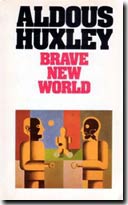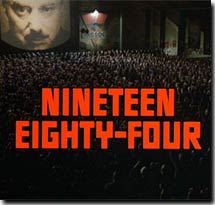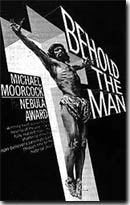The Hyperreality of Time: Past, Present, Future & Science Fiction
Saturday, December 10, 2005 → by Danieru"Predictive programming works by means of the propagation of the illusion of an infallibly accurate vision of how the world is going to look in the future". Through the circulation of science "fiction" literature, the ignorant masses are provided with semiotic intimations of coming events. Within such literary works are narrative paradigms that are politically and socially expedient to the power elite. Thus, when the future unfolds as planned, it assumes the paradigmatic character of the "fiction" that foretold it. - link
 A theory in need of a Mu response if ever I saw one. Thing is, the scope of this idea is not broad enough. It is underwhelming because it assumes too many things about reality and misinterprets many of the fundamental conflicts in the concept of time. An ultimate irony since science fiction is the tool of choice for examining both. Before I go into more detail here I will offer you a question to ponder throughout this post, one which a friend threw my way some time ago now:
A theory in need of a Mu response if ever I saw one. Thing is, the scope of this idea is not broad enough. It is underwhelming because it assumes too many things about reality and misinterprets many of the fundamental conflicts in the concept of time. An ultimate irony since science fiction is the tool of choice for examining both. Before I go into more detail here I will offer you a question to ponder throughout this post, one which a friend threw my way some time ago now:If you took a piece of contemporary fiction and sent it hurtling back into the past would it instantly become science fiction? Would a contemporary commentary become a predictive tool? Or would its hyperreality transcend the time-line, dissolving any futures it might have foretold into wisps of mere possibility?Science fiction - a transcendence from reality. In an age where progress appears illusionary, each new technological and scientific discovery shattering the realities we inhabit, science fiction has become an escape route equal to that of the literary realism of the mid-19th Century.
 In order to bring into focus the events of change which surround us science fiction in all its forms has manifested alternate visions of ourselves, not as we wish to be, in the postmodern utopian sense, but as we subconsciously believe we already are.
In order to bring into focus the events of change which surround us science fiction in all its forms has manifested alternate visions of ourselves, not as we wish to be, in the postmodern utopian sense, but as we subconsciously believe we already are.The scientific optimism of the mid-20th Century was laid waste during the nuclear stale-mates and medical nightmares of the following decades. Mankind wielded science and technology as a tool for reality absolution, infinite possibilities blooming just ahead of us. Yet as science increased in complexity so too did our removal from the worlds it envisaged. Once the specialist of the genius, science became in the eyes of society the leash through which the elite drove the masses forward. Technology lashed us down, science blinkered the truth. Or so many people felt, and still feel. Science became the enemy of the people and yet it remains the opium we crave. Even religion embraced 'theories' that science made 'real' in order to thrive in today's rational climate.
 Debate as to what we are has never been so incessant. Debate as to where we will go has never been so readily available. Just buy a cinema ticket and strap yourself in.
Debate as to what we are has never been so incessant. Debate as to where we will go has never been so readily available. Just buy a cinema ticket and strap yourself in."Currently, from one order of simulacra to the next, we are witnessing the reduction and absorption of the distance [between the real and the imaginary], of this separation which permits a space for ideal or critical projection...So wrote Jean Baudrillard some 30 odd years ago, his words seeming to knell the death of civilisation. How can we be living a utopia? States with equal happiness for all do not exist, have never existed, could never exist... and yet science fiction has made and destroyed these fictions countless times. What is there left to find in the pages of such utopias?
Reality was able to surpass fiction, the surest sign that the imaginary has possibly been outpaced. But the real could never surpass the model, for the real is only a pretext of the model.
The imaginary was a pretext of the real in a world dominated by the reality principle. Today, it is the real which has become the pretext of the model in a world governed by the principle of simulation. And, paradoxically, it is the real which has become our true utopia, but a utopia that is no longer a possibility, a utopia we can do no more than dream about, like a lost object." - link
 In perceiving the horror of Orwell's 1984 or the oxymoronic tranquility of Huxley's Brave New World utopia is simulated out of existence. We tend to forget that Hitler and Stalin both grew utopias, all be it from different seeds. In reflection of these utopias, both the simulated and real, our own world has been given a yard stick by which to judge itself by, a false memory of hell by which to perceive our even falser heaven. But we do not. Science fiction and speculation stand here no more or less real than actual history. In all four of these utopias we can perceive our dim reflection peering back at us across the mists of time. It makes them all equally real.
In perceiving the horror of Orwell's 1984 or the oxymoronic tranquility of Huxley's Brave New World utopia is simulated out of existence. We tend to forget that Hitler and Stalin both grew utopias, all be it from different seeds. In reflection of these utopias, both the simulated and real, our own world has been given a yard stick by which to judge itself by, a false memory of hell by which to perceive our even falser heaven. But we do not. Science fiction and speculation stand here no more or less real than actual history. In all four of these utopias we can perceive our dim reflection peering back at us across the mists of time. It makes them all equally real.Likewise our present is an illusion for the future populations of Earth, we reflect to them the horrors they will overcome, the utopian visions they are yet to realise. Science fiction is history, is future, is present. We only know ourselves through it, we only exist because of it. Perception of today's real is reflection of science fiction's hyperreal.
And finally, if science fiction transcends illusion, becoming in retrospect a kind of hyperreality through which we better perceive ourselves, what is The Real anyway? The past-fiction presents to the future-real what the hyperreal-present was all about. Only by perceiving the past and future can the present be said to exist at all; only in fiction do we know the real. And in the end, surely it is reality itself that is the ultimate conspiracy.
Extended hyperreality:
- For more on Simulacrum and Simulation you must read Jean Baudrillard.
- To perceive time dissolving into transcendent copies of itself, bringing into focus the real, there is no greater guide than Ubik by Philp K Dick.
- What if the knowledge contained in the most (in)famous book of all time was sent back in a time machine? Michael Moorcock explores this possibility in his semi-forgotten sci-fi classic Behold the Man.
UPDATE: Been twirling the internet highways to find some more on the conspiracy which originally inspired this post:
If you're concerned about science fiction's power over your reality go here and await further instructions - let's just say E.T. and Jesus got some similarity issues. Also, did you know that the Illuminati have been orchestrating humanity's unhappiness for the last thousand years by suppressing the global consciousness from vibrating at its innate, infinite frequency? I didn't either, but don't worry too much. Infinite Love and David Icke are going to sort everything out - taking random events and tying them together in increasingly incomprehensible knots of paranoia since 1990.
You've got to love conspiracy theories, here's to making my own up someday. The Huge Entity isn't one to shy away from utter nonsense.
Time has made a stop...
Check out the categories below for more hyperreality from The Huge Entity.
|
|

 Links
Links Subscribe via RSS!
Subscribe via RSS!


 Via Email
Via Email


The again, we are not so far away from 1984.
December 11, 2005 4:06 AM
it makes me wonder about how fiction formed the human brain in the first place. as soon as we evolved primitive language there would have been stories, reflections of possible worlds which made more real the one we lived in. stories evolved our socially adept brains. they helped build our concepts and our realities. fiction stands realer than the real because of this.
all those hippy types who were building the future paradise in the 60s are now stock brokers and strict, conservative parents
such was the depth of their reality
December 11, 2005 4:23 AM
It's because they thought in absolute terms - as in, "all those hippies" - that they couldnt' see beyond the dream and sold out to the illusion. This didn't happen to ALL of them. Granted it did happen to most and it makes me sick. I wish I had been alive during the days of Tim Leary and Allen Ginsberg, but all I have are a generation of elders who have become corporate whores or crazy bums on the street - but it is the exceptions that make the rule , and I can attest that many of "those hippy types" are still going strong, just as idealistic and subversive as ever, albeit a bit less naive for the experiences ov T.I.M.E.
December 11, 2005 4:35 AM
December 12, 2005 8:14 AM
religious texts/doctrines are another example of the building of shared realities and yet even then, sometimes only tens of years after they have been formed, new religious factions splinter off, new interpretations of the same texts manifest completely alternate realities (which are often protected to fundamentalist proportions).
just like the process of evolution in the natural world, if change occurs frequently and incessantly enough in the end you have many species from the one germ, now unable to share their genetic material. i have a hunch that reality is this too. the human world has been splintering for tens of thousands of years, and before that realities multipied and separated from billions of origins. this process is constant, reality change is part of the evolution of the universe. the more realities the more in focus the universe becomes.
i often wonder whether we should accept the fact that conflicts in these realities HAVE TOO occur or we stand up and pretend that we can draw back the edges of our worlds, sewing them together with humanity's 'wealth' of understanding... the pessimist in me knows it will never happen, and besides, i welcome our different realities.
there is no conspiracy. there is simply change. if we accepted this then the human world might just mould part of its shared illusion back together
December 12, 2005 9:14 AM
The virtual now is what takes the place of the real; it is the final solution of the real in so far as it accomplishes the world in its definitive reality and marks its dissolution."
Jean Baudrillard - Passwords
December 14, 2005 4:09 AM
August 19, 2006 12:21 PM
Post a Comment